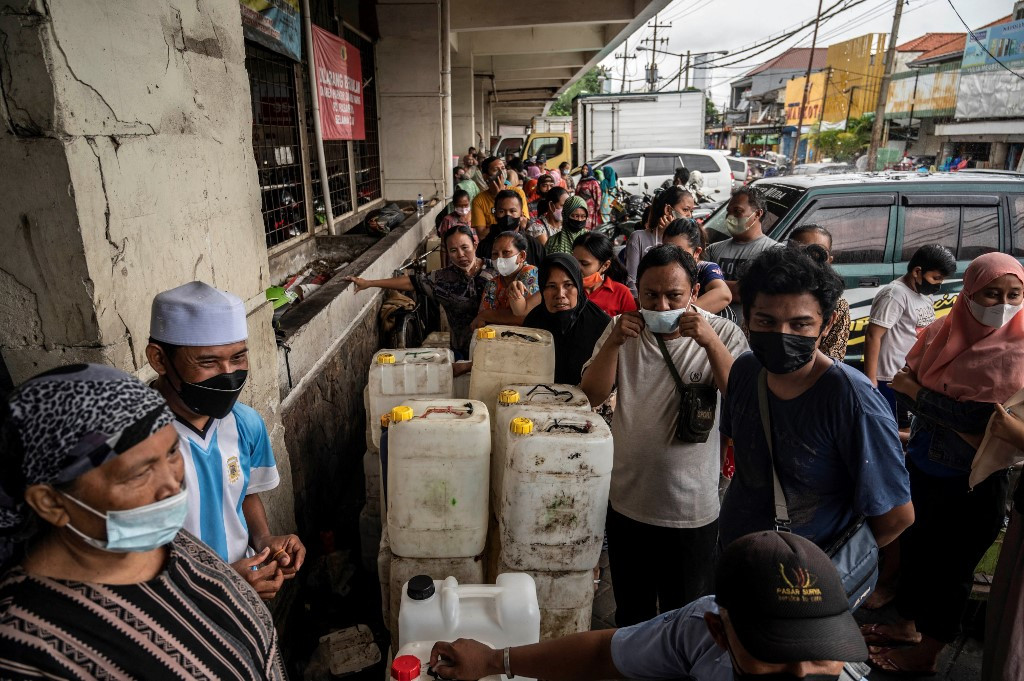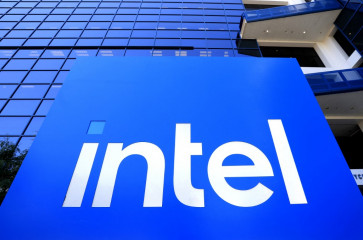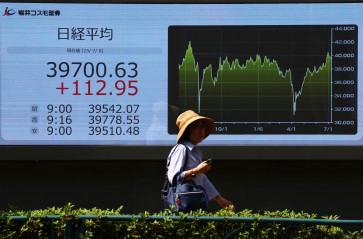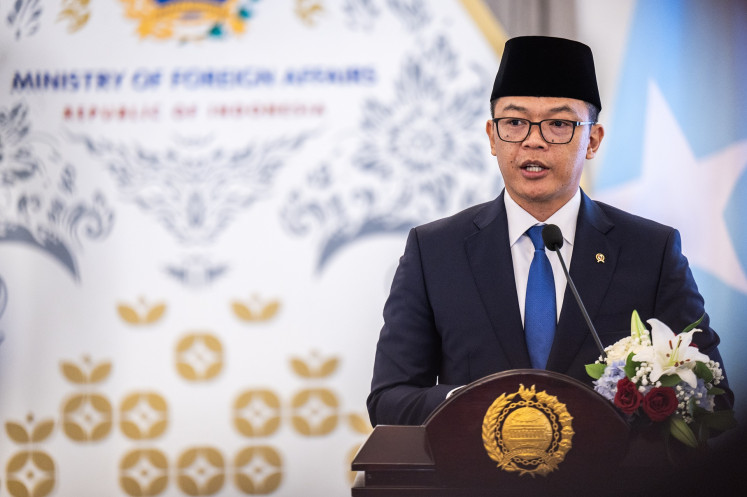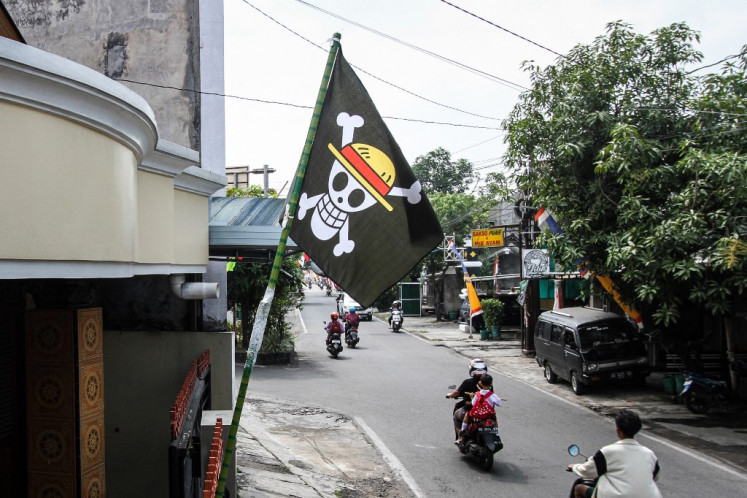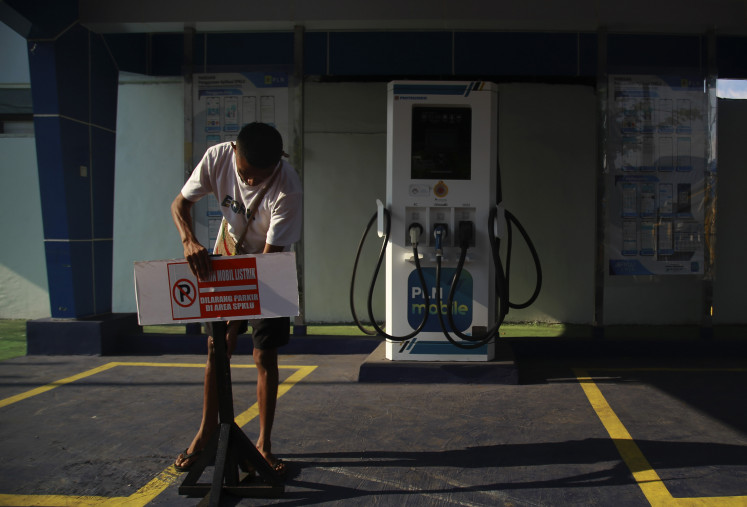Popular Reads
Top Results
Can't find what you're looking for?
View all search resultsPopular Reads
Top Results
Can't find what you're looking for?
View all search resultsJokowi’s popularity slumps as prices rise
President’s approval rating drops by 11.8 percentage points amid Ukraine war-induced inflation.
Change text size
Gift Premium Articles
to Anyone
P
ublic approval of President Joko “Jokowi” Widodo has fallen nearly 12 percentage points in the past two months, according to a survey conducted by Indikator Politik Indonesia at the height of soaring prices of basic commodities, particularly cooking oil.
The survey interviewed 1,220 people of voting age in person nationwide between April 14 and 19, before the government announced a ban on exports of cooking oil and its raw materials. It was also conducted before the Attorney General’s Office (AGO) named suspects in the alleged corruption case reportedly related to a scarcity of cooking oil and its subsequent high price on the local market.
The poll found that Jokowi’s approval rating had fallen to 59.9 percent in April from 71.7 percent in February and 75.3 percent in early January, when the prices of staple goods, particularly cooking oil, were relatively low.
“Not to mention that people at the time [in January] were happy with how [the government] handled the pandemic [as the Delta fueled-wave of coronavirus infections subsided],” Indikator Politik executive director Burhanuddin Muhtadi said on Tuesday.
The January rating was the highest in Jokowi's seven years in office, while the April rating was only slightly higher than his last year's record low of 59.3 percent in July, during the worst of the Delta-fueled wave.
The government had introduced a price cap for packaged cooking oil in early January to keep the staple food affordable despite soaring global crude palm oil (CPO) prices, but revoked it in March in favor of a direct cash transfer scheme. The revocation led to soaring cooking oil prices that month.
Read also: Palm oil crisis shakes up Indonesia's politics, global supplies
Also in January, the government implemented a domestic market obligation (DMO) policy that required CPO producers to sell a portion of their planned exports at home at certain prices, to keep cooking oil affordable. The government revoked the DMO in March in favor of higher palm oil export levies. Violations of the DMO policy in the issuing of palm oil export permits are also at the heart of the alleged corruption case currently being handled by the AGO.
Soaring prices of basic commodities, particularly the much sought-after cooking oil, were one of the main reasons that contributed to Jokowi's declining approval rating, the survey found.
"If [Jokowi] wants to bring it back [a rising approval rating], [his administration] must achieve breakthroughs on these fronts: corruption eradication, particularly in the cooking oil [policy] and the national economy, inflation and cooking oil scarcity must be reduced," Burhanuddin said.
A similar trend also appeared in two different recent polls, which found that Indonesians have become more pessimistic about the economy in recent public opinion polls as they pay more for gasoline and food amid rising inflation made worse by Russia's invasion of Ukraine.
A survey released on Monday by Litbang Kompas, the research arm of Kompas daily, found 66.3 percent of respondents did not think the government would be able to control the increase in prices of basic commodities, while 32 percent thought otherwise and the remaining 2.7 percent were neutral.
It also found that 43.8 percent of respondents believed that the government would not be able to ensure the availability of goods during the Ramadan fasting month, while 53.5 percent said otherwise and 1.2 percent were neutral. The survey was based on telephone interviews conducted from April 5 to 9 with 504 people of voting age throughout the country.
Read also: AGO blames corruption for cooking oil scarcity
The findings came as cooking oil prices rose by more than 70 percent annually, data from the Trade Ministry show. People have had to stand in line to buy limited supplies of bulk cooking oil at government-capped prices, set at about half the market price.
The prices of other staples like soybeans, sugar and eggs also rose by between 50 and 90 percent annually a week before Ramadan, which usually sees price hikes as demand grows for these commodities.
The survey found a general perception that Jokowi’s administration has been paying less attention to the economic hardship experienced by many Indonesians and focusing too much on political matters instead.
About 51.3 percent of respondents said the government was prioritizing the construction of the new capital city more than the economy, 40.7 percent said it was putting more focus on the third-term extension plans and 56.8 percent said it was focusing more on other political issues.
“Prioritizing the people today is very important if the government does not want to lose the public's trust. The hardships caused by the scarcity of basic commodities has aroused a degree of pessimism,” the survey concluded as quoted from Kompas.
Read also: Surging prices may erode Jokowi’s support
Another poll conducted in mid-April and released on Monday by Charta Politika found public optimism about the economic situation over the next year plunged from 72.9 percent in November of last year to 59.6 percent this month, the lowest in the past year. A total of 1,220 eligible voters were interviewed in person for the survey.
“Looking at the data, this is not the worst situation compared with that of May 2020. But we still saw a decline in optimism in the last three surveys [after the November poll],” Yunarto Wijaya of Charta Politika said. “This is a warning sign as the figure had already fallen below 60 percent.”
Most of the respondents were still satisfied with Jokowi’s leadership as he enjoyed a 62.9 percent approval rating in April this year, but the rating has fallen by 8.8 percentage points from 71.7 percent in January as concerns about rising staple goods prices undermined public confidence.
Respondents were mostly dissatisfied with the government's policies in making basic needs more affordable, with 47.6 percent saying rising prices were the main concern.
Yunarto said that a Cabinet shakeup and “a change in management” were needed to regain public confidence.
“[A Cabinet reshuffle] can serve as a stimulus to restore public satisfaction with the government,” he said. “Not in a sense of reorganizing the [ruling] coalition of political parties but rather it must be in the context of responding to the problems faced by the people regarding very basic issues such as the need for [affordable] food.”
– Ina Parlina contributed to the story

